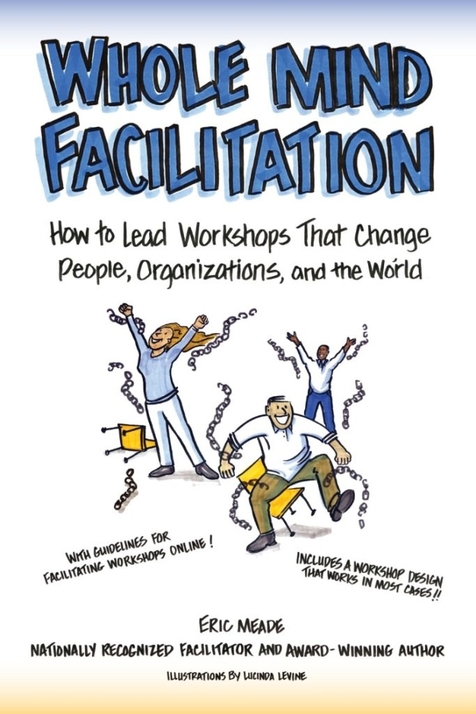
In Whole Mind Facilitation: How to Lead Workshops that Change People, Organizations, and the World, award-winning writer Eric Meade provides innovative and intellectually sound strategies for workshop leadership.
Meade’s thesis is simple, using the model of a house in which there are two rooms, with a basement. The rooms are Intuition and Thought, and the basement is Emotion. Meade states that to get from thought – one’s ideas and factual material regarding an issue – to intuition – one’s ability to create new ideas around that issue, one must pass through “the basement” – embracing personal motivation and insight, but emotions can be harder to access.
A facilitation workshop is distinct from a meeting in which reports are given and assignments made, or a training session in which all are focused on learning set tasks, and can help participants explore not only new thoughts, but new vision. Meade demonstrates how the facilitator should organize and conduct a workshop with specific techniques – gathering the group in a circle of chairs, removing tables, utilizing flip charts, perhaps inviting an expert speaker, organizing time to include reasonable breaks, and more.
At each stage of the process, Meade also stands back, projecting himself as the facilitator, suggesting methods that have worked best for him and offering suggestions from proven resources. He deals with such thorny issues as handling participants who talk too much, continually “loop back” the same ideas, or who are reticent or introverted. The “journey,” as Meade likes to call it, will move participants through the inner process from thought (defining the problem) through emotion (exploring feelings and refining motivations) to intuition (discovering new approaches).
Interestingly, Meade, whose book was completed at the outbreak phase of Covid-19, acknowledges that the realm of group facilitation is and may continue to be quite different based on the restrictions imposed by the virus and their possible duration. For that reason he has added a useful segment that presents strategies suitable to those limitations: “Facilitating the Whole Mind…Online.” There he postulates that virtual workshops would be far shorter than in-person presentations and might include several sessions with smaller groups of participants, while the guiding principles would remain the same. The inclusion of this segment will assist those currently involved in workshop planning to move forward to the new era while retaining the useful principles Meade espouses for workshop facilitation success.
As the leader of the Whole Mind Strategy Group consulting firm, regularly facilitating workshops as well as teaching strategic planning at American University, Meade gives the book immense authority. From the start, one realizes that the author is writing from hands-on experience that is as illustrative and informative as actually running a workshop. There aren’t many books on any topic that can be deemed “definitive,” but this book is one of them – not only for the breadth of experience, but the accessibility of the information, even making the read entertaining through the emotive line drawings of Lucinda Levine.
Though a short read, Whole Mind Facilitation is authoritative and enlightening – even for a layperson who may not be in charge of facilitation, which is a testament to the book’s organization, concise information, and engaging tone throughout.
Book Links
STAR RATING
Design
Content
Editing
Get an Editorial Review | Get Amazon Sales & Reviews | Get Edited | Publish Your Book | Enter the SPR Book Awards | Other Marketing Services






















Leave A Comment